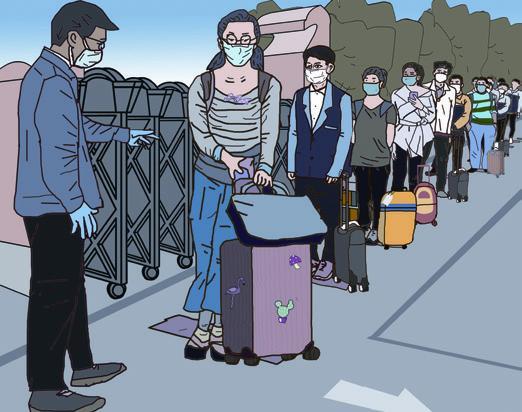Should Colleges Seal Off Campuses For the Fall Semester?

Universities and colleges across China will receive returning students and freshmen in the coming weeks. The Ministry of Education (MOE) has asked colleges and universities to take measures to prevent any surge in novel coronavirus disease (COVID-19) cases. Some colleges, including some in Beijing, which hosts the largest number of students, have decided to seal off their campuses after the students arrive.
Opinions differ on whether this is a sound practice. Some believe that since COVID-19 has not been totally eliminated and is still spreading across the world, with no effective vaccines available, it is necessary to remain vigilant. After all, with clusters of people in classes, canteens and libraries, campuses are a key target for strict control. Therefore, although sealing off campuses may cause problems and inconvenience for students, its a worthwhile sacrifi ce.
Others believe that to seal off campuses will not only affect students daily life and learning, but more importantly, it will restrict senior students, who will need to do internships or job hunt. Since COVID-19 has basically been curbed in China, it is not necessary for colleges to impose such draconian measures. They think colleges should be more fl exible and allow students to leave campus for urgent and important matters.
Strict but not rigid
Wang Zhongdi (guancha.gmw.cn): According to recent notices by MOE, most colleges and universities have worked out schedules for students return to the campus. The priority is to ensure that every student returns safely and colleges return to normal teaching activity. For college students, they are most concerned about their studies and daily life after returning to campus and hope that their life will not be interrupted by too many restrictive measures.
For the sake of virus prevention and control, there will have to be some changes to previous regulations and operations on campus. Students should try to adapt to the measures put in place to contain the virus, while colleges need to try their best to make life on campus convenient for students, instead of imposing rigid regulations in the name of COVID-19 prevention and control indiscriminately.
These measures are aimed at restricting students from leaving campus. We dont doubt the good intention of these practices, however, seniors will have to job hunt and attend job fairs and job interviews, while other students may have to take on internships. Some universities have several campuses on different sites and there will inevitably be interaction between groups on different campuses.
China has already developed a set of effective dynamic mechanisms against COVID-19. When there is a sign of resurgence, risk control measures are immediately tightened, along with more nuanced tactics. This can minimize the impact on social and economic life in the process of curbing the spread of the virus.
Although colleges are different from ordinary residential communities, they should not be excluded from the host citys general management network. Social activities among college students are relatively limited, so its not difficult to track their whereabouts. If they are required to register their outings, it shouldnt be too difficult to contain the risk of COVID-19 resurgences.
Of course, both colleges and students should realize that its necessary to minimize social activities to cut off the channels of virus infection. In some cases, internships or social work can be done online. Businesses should offer more of these posts to college students so that they wont need to leave campus. In addition, for the upcoming recruitment of new employees, businesses should try to conduct exams and interviews online to simplify procedures.
Its absolutely necessary for colleges to take measures to contain COVID-19, but they will backfire if they are tougher than necessary. If students feel life is too inconvenient on campus or class teaching fails to go back to normal, harsh rules like sealing off campuses may have to be replaced with fl exible and effective methods.
Xiaoxing (baijiahao.baidu.com): According to the Beijing Municipal Education Commission, colleges and universities in Beijing can decide when to reopen and will be put under relatively closed management.
Millions of college students will arrive in the capital. In the face of these huge numbers, sealed-off campuses may not do much to help with virus prevention and control, but they could cause a lot of inconveniences for students.
Sealing off campuses will pose a big obstacle to students daily life, particularly to senior and graduate students. Their internships and normal outings will be restricted. We dont know whether this kind of isolation will really help with virus prevention because while students will be restricted to a limited area, staff members, such as teachers, are allowed to go in and out of campus. We cant help wondering whether this kind of sealing off is really effective.
Better safe than sorry
Jiang Jingjing (www.thecover.cn): Risk levels vary in different areas, so colleges and universities need to craft their own methods on how to manage their campuses after reopening. Education authorities should not demand colleges seal off campuses or restrict students from leaving the campus.

Epidemic prevention and control is not a common part of college management, so they need to be more fl exible. Authorities should also respect colleges respective decisions based on their realistic conditions.
Nothing is back to normal yet, so under these special conditions, all sides need to communicate with and understand each other more, so as to weather these hard times safely.
Colleges also need to listen to studentsopinion while working out rules on school management so that they really suit students, which will in turn help with teaching and learning.
Pingyuefengjing (baijiahao.baidu.com): Is it necessary to seal off campuses? The answer is yes. The virus is still spreading across the world. If students are allowed to go wherever they want, they may come across someone who has just returned from a heavily affected country. If the student gets infected and goes back to campus and mixes with his/her classmates, the consequences will be disastrous.
Remember, sometimes COVID-19 patients are asymptomatic. If students go off campus or asymptomatic patients are allowed on campus, the risk of getting infected will increase considerably. Given the various possible grim scenarios that could lead to infection, its better to impose strict control on students rather than relax it too quickly.

